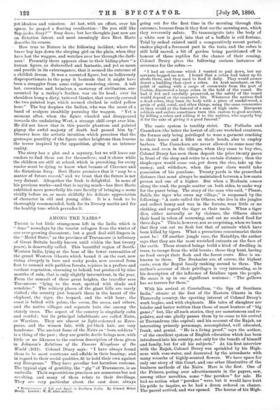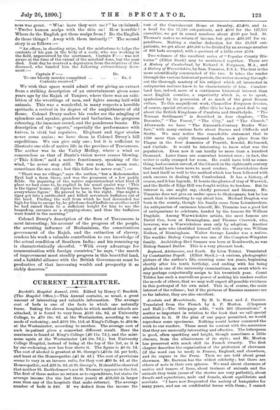AMONG THE NAIRS.* THERE is but little strangeness left in
the India which is " done " nowadays by the tourist refugees from the winter of our ever-growing discontent ; but a good deal still lingers in the " Model State," as the province of Travancore (a tributary of Great Britain hardly known until within the last twenty years), is deservedly called. This beautiful region of South- Western India, lying at the base of the lower extremities of the grand Western Ghauts which bound it on the east, now rising abruptly in bare and rocky peaks, now covered from foot to summit with pathless forests, rejoices in a profuse and verdant vegetation, charming to behold, but produced by nine months of rain, that is only slightly intermittent, in the year, From the summit of these great heights, the traveller sees Travancore "lying to the west, spotted with shade and sunshine." The solitary places of the giant bills are rarely visited ; the country just beneath them is the haunt of the elephant, the tiger, the leopard, and the wild boar; the coast is belted with palms, the cocoa, the areca, and others, and the native villages and separate huts rise among the stately trees. The aspect of the country is singularly calm and restful ; but its principal inhabitants are called Nairs, or Warriors. They are almost as light-coloured as Euro- peans, and the women fair, with jet-black hair, 'are very handsome. The ancient fame of the Nairs as " born soldiers " is a thing of the past ; they are gentle, docile beings now, with little or no likeness to the curious description of them given in Johnson's Relations of the Famous Kingdoms of the World (1611). Colonel Drury says : " I have always found them to be most courteous and affable in their bearing ; and in regard to their social qualities, fit to hold their own against any Europeans." They have peculiar but harmless customs. The typical sign of gentility, the " gig " of Travancore, is an umbrella. Their superstitious practices are numerous but not revolting, and many of them relate to their dwellings. They are very particular about the east door, always
• Reminiscences of Life and Sport in Southern India. By Colonel Heber Drury. London : W. H. Allen and Co.
going out for the first time in the morning through this entrance, because from it they first see the morning Gam, which they reverently salute. To transmigrate into the body of a white cow is good, into that of a buffalo is evil fortune. Trial by ordeal existed until a comparatively recent period; snakes played a foremost part in the tests, and the cobra is still held sacred, a bit of garden being partitioned off in honour of those reptiles for the chance of their coming. Colonel Drury gives the following curious instances of reverence for the cobra :- " I had an outhouse which I wanted to pull down, but my servants begged me not. I found that a cobra had taken up its abode there, and they used to feed it daily. They would sooner desert a building than eject a cobra. An Arab merchant, on the point of sailing with a cargo of cocoa-nuts from the port of Cochin, discovered a large cobra in the hold of the vessel. He had it fed and carefully preserved, as the safety of the vessel would depend on the creature's life. Whenever the natives find a dead cobra, they burn its body with a piece of sandal-wood, a grain of gold, coral, and other things, using the same ceremonies as they would at the funeral of a man of high caste. European soldiers and sailors sometimes turn this custom to good account, by killing a cobra and selling it to the natives, who eagerly buy it for the sake of giving it a good funeral."
The caste system is terribly strict. The Pulleahs and Caanekars (the latter the lowest of all) are wretched creatures, the former only being privileged to wear a garment reaching to their knees and a fillet on their heads, also to employ barbers. The Caanekars are never allowed to come near the town, and even in the villages, when they came to buy rice, Colonel Drury has seen them deposit the price twenty paces in front of the shop and retire to a certain distance; then the shopkeeper would come out, put down the rice, take up the money, and withdraw, when the poor slave would take possession of his purchase. Twenty yards is the prescribed distance that must always be maintained between a low-caste person and one of a higher. But when a Brahmin comes along the road, the people scatter on both sides, to make way for the purer being. The story of the man who said, " Please, Sahib, the tiger who owns my village," is surpassed by the following : "A caste called the 011ares, who live in the jungles and collect honey and wax in the forests, wear little or no clothing, and regard the tiger as their uncle. When a tiger dies, either naturally or by violence, the 011ares shave their head in token of mourning, and eat no cooked food for three days." This is, however, not so surprising, when we learn that they can eat no flesh but that of animals which have been killed by tigers. What a precarious commissariat theirs must be ! Of another jungle race, the Naiaddys, the author says that they are the most wretched outcasts on the face of the earth. These stunted beings build a kind of dwelling in trees, to escape from the wild beasts ; these they hunt, having no food except their flesh and the forest roots. Rice is un- known to them. The Brahmins are, of course, the highest caste, even the Royal family ranking second to them. The author's account of their privileges is very interesting, so is his description of the influence of fatalism upon the people- He sums it up in one significant sentence : " The gallows has no terrors for them."
With his arrival at Courta,lluna, " the Spa of Southern India," situate at the foot of the Eastern Ghauts in the Tinnevelly country, the sporting interest of Colonel Drury's work begins, and with elephants. His tales of slaughter are briefer and better written than those of most hunters of " big game ;" but, like all such stories, they are monotonous and re- pulsive, and one gladly passes them by to come to his arrival at Trevandrum (the capital) and his account of the Rajah, an interesting princely personage, accomplished, well educated, frank, and genial. " He is a living proof," says the author, " of the excellent system of English education which has been introduced into his country, not only for the benefit of himself and family, but for all his subjects." At his first interview with the Rajah, Colonel Drury was sprinkled by his High- ness with rose-water, and decorated by the attendants with many wreaths of highly-scented flowers.. We have space for only one story of this Court, and one other illustrative of the business methods of the Nairs. Here is the first. One of the Princes, poring over advertisements in the papers, saw, among other novelties, some "fine perukes" for sale. He had no notion what " perukes " were, but it would have hurt his pride to inquire, so he had a dozen ordered on chance. The parcel arrived, and was opened. The horror of his High-
ness was great. ".What( have they sent me ? " he exclaimed. " Twelve human scalps with the skin on ! How horrible ! Where do the English get these scalps from P Do the English do these things ? Away with them instantly ! " The second story is as follows An officer, in shooting snipe, had the misfortune to lodge the contents of his gun in the body of a cooly, who was working in the field, unperceived by the sportsman. Captain F— was not aware at the time of the extent of the mischief done, but the man died. Next day he received a deputation from the relatives of the deceased, who handed him the following extraordinary docu- ment :— Captain F — Dr.
To one bloody murder committed Rs. 5 Contents received."
We wish that space would admit of our giving an extract from a striking description of an entertainment given some years ago by the Rajah of Tanjore, where there was an exhi- bition of the wrestlings of men, and fights among half-wild animals. This was a wonderful, in many respects a horrible speCtacle, a revival in its degree of the amphitheatre of old Rome. Colonel Drury makes his reader see the mingling of splendour and squalor, grandeur and barbarism, the gorgeous colouring, the immense crowd, and the ponderous beasts. His description of the " sports," especially the performance with knives, is vivid but repulsive. Elephant and tiger stories never come amiss ; we have them in Colonel Drury's hill expeditions. We can give only one ; but it is sufficient to illustrate one side of native life in the province of Travancore. The author was in the Valley Mullay, where a wind as remorseless as that of Dante's vision never ceases blowing. (" This fellow," said a native functionary, speaking of the wind, "he never stop still. The sun rest, the moon rest; sometimes the sea rest ; but this fellow he never rest.") :— "There was no village," says the author, "but a Mahommedan Ryot had a farm there, and was the possessor of a few paddy fields. On inquiring of the native superintendent what kind of place we had come to, he replied in his usual quaint way : ' This is the tigers' house; all tigers live here; here tigers, there tigers, everywhere tigers.' He proved to be in the right. One night a tiger got into a cattle-shed and killed seventeen buffaloes out of the herd. Finding the wall from which he had descended too high for him to escape by, he piled one dead buffalo on another until he had raised them to a sufficient height for him to use the heaped-up carcases as a stepping-stone, and thus the buffaloes were found in the morning."
Colonel Drury's description of the flora of Travancore is most interesting; his account of the progress of the people, the arresting influence of Brahminism, the conscientious government of the Rajah, and the extinction of slavery, renders his work a valuable contribution to our knowledge of the actual condition of Southern India; and his summing-up is characteristically cheerful. " With every advantage for communication with foreign countries," he says, "the march of improvement must steadily progress in this beautiful land, and a faithful alliance with the British Government must be productive of that increasing wealth and prosperity it so richly deserves."



































 Previous page
Previous page